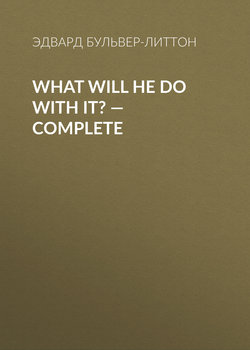Читать книгу What Will He Do with It? — Complete - Эдвард Джордж Бульвер-Литтон, Эдвард Бульвер-Литтон - Страница 18
BOOK I CHAPTER XVIII
ОглавлениеBeing devoted exclusively to a reflection, not inapposite to the events in this history nor to those in any other which chronicles the life of men.
There is one warning lesson in life which few of us have not received, and no book that I can call to memory has noted down with an adequate emphasis. It is this: “Beware of parting!” The true sadness is not in the pain of the parting, it is in the When and the How you are to meet again with the face about to vanish from your view! From the passionate farewell to the woman who has your heart in her keeping, to the cordial good-by exchanged with pleasant companions at a watering-place, a country-house, or the close of a festive day’s blithe and careless excursion,—a cord, stronger or weaker, is snapped asunder in every parting, and Time’s busy fingers are not practised in re-splicing broken ties. Meet again you may; will it be in the same way?—with the same sympathies?—with the same sentiments? Will the souls, hurrying on in diverse paths, unite once more, as if the interval had been a dream? Rarely, rarely! Have you not, after even a year, even a month’s absence, returned to the same place, found the same groups reassembled, and yet sighed to yourself, “But where is the charm that once breathed from the spot, and once smiled from the faces?” A poet has said, “Eternity itself cannot restore the loss struck from the minute.” Are you happy in the spot on which you tarry with the persons whose voices are now melodious to your ear? beware of parting; or, if part you must, say not in insolent defiance to Time and Destiny, “What matters!—we shall soon meet again.”
Alas, and alas! when we think of the lips which murmured, “Soon meet again,” and remember how in heart, soul, and thought, we stood forever divided the one from the other, when, once more face to face, we each inly exclaimed, “Met again!”
The air that we breathe makes the medium through which sound is conveyed; be the instrument unchanged, be the force which is applied to it the same, still the air that thou seest not, the air to thy ear gives the music.
Ring a bell underneath an exhausted receiver, thou wilt scarce hear the sound; give the bell due vibration by free air in warm daylight, or sink it down to the heart of the ocean, where the air, all compressed, fills the vessel around it,’ and the chime, heard afar, starts thy soul, checks thy footstep, unto deep calls the deep,—a voice from the ocean is borne to thy soul.
Where then the change, when thou sayest, “Lo, the same metal,—why so faint-heard the ringing?” Ask the air that thou seest not, or above thee in sky, or below thee in ocean. Art thou sure that the bell, so faint-heard, is not struck underneath an exhausted receiver?
